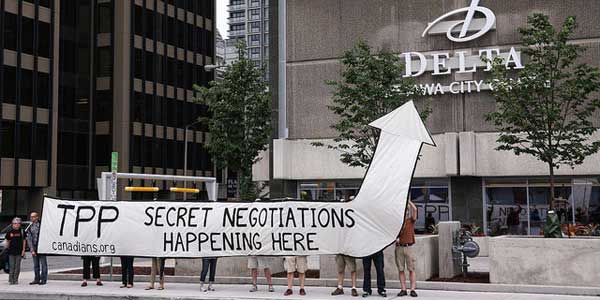Like this article? rabble is reader-supported journalism. Chip in to keep stories like these coming.
On Oct. 5, during this past federal election, Justin Trudeau issued a statement on the Trans-Pacific Partnership (TPP) promising, “If the Liberal Party of Canada earns the honour of forming a government after October 19th, we will hold a full and open public debate in Parliament to ensure Canadians are consulted on this historic trade agreement.”
The Council of Canadians has stated that this should mean a full public review including a comprehensive and independent analysis of the TPP text by the Parliamentary Budget Officer (that would assess the deal’s impact on human rights, health, employment, environment and democracy), public hearings in each province and territory, and separate and meaningful consultations with First Nations. The Canadian Centre for Policy Alternatives has highlighted that, “[Trudeau should also inform] TPP partner countries Canada cannot be bound by the agreement as negotiated, and that public input could result in Canadian demands for changes.”
The Globe and Mail editorial board has additionally commented, “If [trade minister Chrystia] Freeland and her party are serious about making sure Canadians understand its implications, they will have to give Parliamentary committees the time and resources to go over it section by section and hear testimony from neutral experts. Parliament will have to report back to Canadians in plain language about what they are getting and what they are giving up. And then the government will have to make an argument for ratification, or demand further negotiations to protect Canada’s interests.”
What we are getting so far from the Liberal government is quite different.
A not-widely publicized Government of Canada web-page has posted the line, “Canadians are invited to visit this page frequently for consultations activities and regular updates. You can also send your comments at any time via email: [email protected].”
The “TPP consultations” noted on the website appear to only include the trade minister having met with 10 provincial and territorial governments, including B.C. Premier Christy Clark; government representatives from New Zealand, Mexico, Malaysia, Peru, Chile and Australia; industry groups including the Canadian Generic Pharmaceutical Association, the Auto Parts Manufacturers Association, the “Canadian supply-managed sector” and “Canadian business leaders”; and from civil society, only the Canadian Labour Congress, Unifor, and “leaders from academia.”
Non-governmental organizations and First Nations are conspicuously absent from the list of those being consulted.
With respect to their promise to “ensure Canadians are consulted,” they have only provided the email address. And on that front, iPolitics writer BJ Siekierski notes, “The Global Affairs Canada website provides an email address and invites comments from the public on TPP, but doesn’t give a deadline or say what it plans to do with them.”
He also comments, “One possibility would be for the Liberals to do something similar to what the European Commission did for their public consultation on investor-state dispute settlement (ISDS) in their ongoing trade negotiations with the U.S. That consultation lasted between March 27 and July 13, 2014, attracted 150,000 responses, and resulted in a report summarizing the findings last January.” Siekierski suggests the results of that consultation were skewed by NGOs that mobilized the public presumably because 97 per cent of the respondents were opposed to the ISDS provision in the proposed agreement.
In terms of a timeline, we know this: It is expected that the Trans-Pacific Partnership will be signed by all countries — including Canada — at a ceremony on February 4, 2016 in New Zealand. Canada’s trade minister has said that Canada will sign the agreement, but that does not necessarily mean it will ratify the deal. News reports from the Asia-Pacific Economic Cooperation (APEC) summit last month noted, “Leaders [from the 12 TPP countries] agreed on a two-year period for each country’s parliament to approve the deal, meaning it will likely come into force in 2018.”
The United States is a key country in the TPP agreement and while there had been speculation that the U.S. Congress could vote on the deal in the spring of 2016, it now appears that the ratification process will not begin until sometime in early 2017, after the November 2016 presidential election. It also appears that the Canadian government will not move to ratify TPP until the situation in the U.S. becomes clearer. Democratic front-runner Hillary Clinton has already expressed her opposition to the TPP and it would make little sense for the Liberals to expend political capital on a deal with tepid public support in Canada only to see it rejected by the new U.S. president.
While the Trudeau government’s consultation process hardly qualifies as a consultation process, please do send your comments on the Trans-Pacific Partnership to [email protected].
For blogs and articles critical of the Trans-Pacific Partnership, please see our campaign web-page here.
Like this article? rabble is reader-supported journalism. Chip in to keep stories like these coming.




